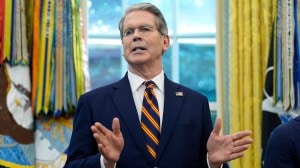China, Taiwan hope talks will "work wonders"
SHANGHAI, Oct 15: Top negotiators from China and Taiwan headed into a second day of high-level talks here on Thursday amid optimism. The ...

SHANGHAI, Oct 15: Top negotiators from China and Taiwan headed into a second day of high-level talks here on Thursday amid optimism. The meeting is the first one on the mainland between the two sides since they split in 1949.
The chairman of Taiwan’s Straits Exchange Foundation (SEF), Koo Chen-fu, was to sit down for a second meeting with his Chinese counterpart, Wang Daohan, in the afternoon after touring the skyscraper-studded New Pudong business zone.
At a luncheon with Shanghai-based Taiwan businessmen, the 81-year-old official emphasised that his landmark trip was only an unofficial sightseeing visit and not a negotiating mission.
But he expressed hope that it would nonetheless “work wonders” for relations between the two sides, bitterly divided since the end of a civil war in 1949.
Koo and Wang held their first meeting in five years late Wednesday, and officials from both sides hailed the discussion as a frank exchange of views and hopes.
But sharp discord emerged immediately about what isnecessary to improve cross-strait relations. Following the meeting, Tang Shubei, vice president of China’s Association for Relations Across the Taiwan Strait (ARATS), told reporters that without direct negotiations on major political differences between the two, little could be accomplished on other issues.
In the absence of official relations between the two sides, China and Taiwan hold all contacts through the semi-official ARATS and SEF.
But Koo dashed hopes of a speedy breakthrough, warning that practical issues topped Taiwan’s agenda. “We can talk about practical issues first and come to political issues along the way,” he said before the talks started.
At Thursday’s luncheon, he emphasised a step-by-step approach, saying the two sides were still technically in a state of hostilities. “Cross-strait relations have not yet normalised,” he said, calling for further exchanges.
China’s holds dearly, the goal of speedy reunification with Taiwan; viewed here as a renegade province. But Taipei’sobjectives for the first-ever visit to the mainland by an official of Koo’s rank is less ambitious: Returning to the regular non-political talks and the “friendly atmosphere” which the two sides enjoyed between 1993 and 1995.
Tang squarely blamed Taiwan for wrecking the rapprochement of that period, which ended when Taiwan President Lee Teng-hui went on an unofficial visit to the United States that infuriated Beijing.
China viewed the visit as a step toward declaring independence and launched a series of military exercises threatening an attempt to re-take the island by force.
The ARATS official said without political talks to remove fundamental differences, any future rapprochements based on civil and economic exchanges alone would be doomed.
SEF spokesman Shi Hwei-yow dismissed the fiery rhetoric as already-established positions of the mainland government.
Koo is scheduled to head to Beijing on Friday, where he will hold unprecedented meetings with leaders including President Jiang Zemin.
Heand Wang launched a period of regular low-level exchanges after decades of hostility, when they first met in Singapore in 1993.
The Taiwan envoy’s schedule on Thursday included visits to Shanghai’s stock exchange and its new museum.
Shanghai’s development in the last eight years is “unimaginable”, he told Taiwan businessmen.
More than 3,000 Taiwan businesspeople are based in the eastern city, which has received three billion US dollars in investment from the island.
In a possible conciliatory gesture, Taiwan on Wednesday eased curbs on investment in the mainland, adding 60 more industrial items to a list of approved areas.
Beijing has condemned Taipei’s attempts to restrict indirect investment, which has poured into the country to the tune of more than 30 billion US dollars.
China regards Taiwan’s separation from the mainland as an outdated product of the Cold War, when the US supported the island as a non-Communist “alternative China” to the Communist mainland.
While Taiwan refers to itselfas the Republic of China, its international prestige began to crumble in 1971 when Beijing wrested the Chinese UN seat from Taipei.
The 1979 US decision to switch diplomatic recognition to the mainland did further damage.
Photos



- 01
- 02
- 03
- 04
- 05




























